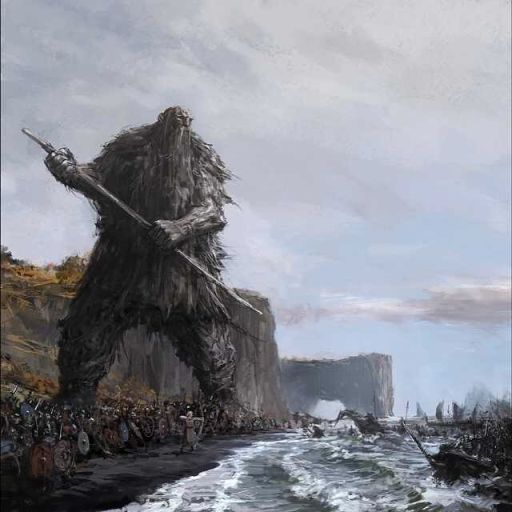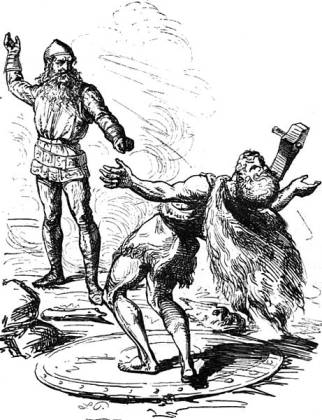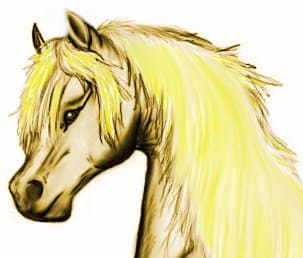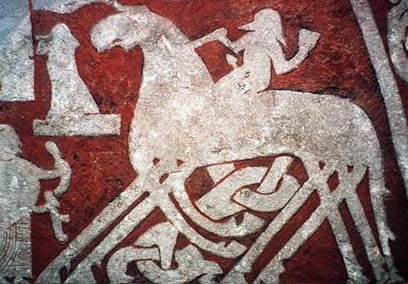In this tale Thor almost meets his end by the Jotun Hrungnir, only to be saved by his then three day old son Magni. It also tells of how a tow became a star and why one should always handle whetstone with great care.
The Mystical Horses of Valhalla
Long ago, a magnificent race of horses pastured in the meadows of heaven. These steeds were more beautiful and swift than any creature known to man, even more than any horse in today’s world (Seabiscuit included).
Hrîmfaxi’s gleaming black hide pulled the chariot of Night across the sky and scattered each dawn’s dew from his foaming bit. He was followed by Glad, who pulled the swift chariot of Day. Glad’s mane gleamed with gold, its beams of light brightening the world.
There were the two shining horses of the sun, Arvakur the watchful and Alsvith the rapid. And the nine Valkyries, notoriously fierce battle-chargers who rode the skies on beautiful white horses, also bore an important duty. They carried the bodies of fallen heroes from the battlefield to the blessed realm of Valhalla.
The gods of Asgard each had their own glorious steed, prettily named things like Gold-mane and Silver-top and Light-foot and Precious-stone. Wonderfully original, I know. These horses carried their masters through the blue sky and billowing clouds, flame blowing from their nostrils and sparks glinting in their fiery eyes. They were truly radiant, magnificent sights to behold. They faithfully carried the Aesir through many of the stories we know today.
But heaven’s most spectacular horse was Sleipnir, the eight-legged steed of Father Odin. His sturdy feet could gallop over land and sea faster than any horse to ever live (sorry, Secretariat). Sleipnir’s hide gleamed a deep, dappled gray, and Odin proudly cherished him. The duo rode into countless adventures and wild times together.
This tale recounts one of Odin and Sleipnir’s many crazy undertakings. So hold onto your horses, dear reader, and prepare to accompany the gods on another epic journey!
Odin Challenges Hrungnir to a Race
One day, Odin decided to visit the freezing-cold realm of Jotunheim, the Land of Giants. He hadn’t visited the old country in quite some time, and he wanted to check on its glittering mountains and icy rivers. So he and Sleipnir set off from Asgard, Sleipnir’s eight hooves flying over the earth and Odin’s golden helmet gleaming in the sunlight (shout-out to Glad).
As they galloped along a road deep in the icy wilderness, a huge giant and its equally-enormous steed suddenly blocked their path!
“Who goes there?” the giant asked gruffly. “Oi, you with the fancy gold helmet. Who are you, riding so confidently? I’ve been watching you from this mountaintop. That’s a mighty fine horse you’ve got.”
“Indeed, there is no finer horse in all the world,” Odin boasted. “Haven’t you heard of Sleipnir, the pride of Asgard? He could leave any of your big, clumsy giant horses in the dust.”
“Ho ho!” the giant exclaimed angrily. “Sleipnir is a special little horse, no doubt. But he’s no match for my powerful steed, Gullfaxi. Come, Asgardian, let’s settle this with a race! And when you lose, you’ll pay for insulting the mighty horses of Jotunheim!”
And without further ado, the giant (whose name was Hrungnir) sprang onto his horse and spurred him straight toward Odin on the narrow path. Odin and Sleipnir shared a look of alarm. They hastily turned and bolted back towards Asgard.
Odin was determined to prove his beautiful horse’s speed, but most importantly, he needed to save himself and Sleipnir from the giant’s wrath! Hrungnir was known as one of the fiercest and cruelest giants of Jotunheim.
Odin and Sleipnir make for home
Sleipnir’s eight slender legs twinkled through the blue sky like a fiery bullet, his muscles straining and hide glistening with sweat. His nostrils flared and sprayed fire and smoke. He darted across the sky as bright and fast as a flash of lightning, Gullfaxi rumbling close behind like thunder.
“Hya, hya!” the giant shouted. “After them, Gullfaxi! And when we’ve overtaken them, we will crush their bones between us!
“Speed, speed, my Sleipnir!” Odin cried. “Run for your life, or you will never feed in the dewy pastures of Asgard with the other horses again! Quickly, now, bring us to Asgard’s gates!”
Sleipnir was more than just a pretty face; he was also extremely intelligent. He quickly understood his master’s words and galloped toward home with all of his might. But would he be fast enough?
The rainbow bridge shimmered in the distance. Heimdall the watchman was already preparing to let them in; his sharp eyes had spotted them from afar, recognizing the blur of Sleipnir’s dappled body and the flash of Odin’s golden helmet.
Gallops and thuds and snorts grew louder and louder as the twelve hooves reached the bridge, the giant’s horse close behind Sleipnir. But Hrungnir finally realized the danger he was rushing into. Giants weren’t welcome in the home of the gods.
He hastily pulled on the reins, but Gullfaxi was tearing forward too quickly. He couldn’t stop!
Heimdall threw open the gates of Asgard and Sleipnir galloped inside with his godly cargo. Gullfaxi was close behind, his giant master purple-faced from anger and hard riding.
Clang! Heimdall shut the gates. The giant was now imprisoned in the castle of his mortal enemies.
Hrungnir A Surprise Guest in Asgard
Unlike giants, the Aesir were courteous folk. They weren’t inclined to take advantage of an enemy unwillingly thrust into their arms. So they invited Hrungnir to join them for food and rest before his long journey home.
Thor was away on business, so they offered his enormous cups to the giant. They were the only vessels big enough to match his huge stature. But Thor was famous for his ability to drink deeply and not lose his head.
Hrungnir’s tolerance was not nearly as high.
He lost his wits embarrassingly quickly (not that he had many to begin with). And a witless giant is a dreadful creature, indeed.

Hrungnir began raging like a madman! He threatened to pick up Valhalla like a toy house and carry it back to Jotunheim. He swore to tear Asgard to pieces and slay all of the gods. But he promised to spare Freyja, the goddess of beauty, and Sif, the golden-haired wife of Thor. He would ever-so-mercifully carry them off like little dolls for his new toy house.
The Aesir found themselves in a pickle. Thor and his hammer weren’t there to protect them. “What should we do?” they fretted.
Hrungnir called for more mead. Only Freyja was brave enough to refill his ale-horn (mead-horn). But the more Hrungnir drank, the fiercer he became.
Finally, the Aesir couldn’t stand his insults and violence any longer. They were also legitimately worried that he would drink every last drop of their mead.
They urged Heimdall to blow his horn and summon Thor. The mighty protector of Asgard soon arrived with his chariot of goats. He dashed into the hall, hammer in hand, and stared in amazement at the deplorable guest sitting at his father’s generous table.
Thor to the Rescue
“What is this!” he roared. “A giant, feasting in Asgard? I must be imagining things. Who gave this insolent fellow permission to sit in my place? And why does fair Freyja wait upon him as though he’s some noble guest? I will slay him at once!”
He raised his hammer with intention. Hrungnir quickly sobered up; he knew the god of thunder was not an enemy to be trifled with.
“I am Odin’s guest,” the giant said. “He invited me to this banquet, and therefore I am under his protection.”
“You will be very, very sorry that you accepted our gracious Allfather’s invitation,” Thor growled. He flexed his gargantuan biceps and wielded Mjolnir threateningly. His expression was murderous. Sif, his beautiful wife, sobbed in his ear, horrified by the giant’s threat to carry her away.
Hrungnir rose to his feet and faced Thor boldly. Thor’s furious voice had restored some of his scattered wits.
“I am here alone and without weapons,” Hrungnir said indignantly. “You would be a fool to slay me now. Do the tales of the mighty Thor describe him as a coward who murders the unarmed? I don’t think so. It would be much better to let me go and meet me later in single combat, both of us armed fairly.”
Thor glared. The Asgardians held their breath.
With a sigh, Thor eventually lowered his hammer. “You make a good point.”
Challenge accepted
“It was foolish to leave my club and shield at home,” Hrungnir continued, empty hands spread in supplication. “Otherwise, I would fight you right here, right now! But the world will call you a coward if you slay me while I stand weaponless.”
“Yes, you’re right,” Thor grumbled. “I will meet you at your Stone City, midway between heaven and earth, and we will fight a duel to the death. You will be punished for disrespecting my Asgardian family in our own home!”
His life spared for the moment, Hrungnir rushed back to Jotunheim’s Stone City. When the other giants heard his tale, they quivered with excitement at the prospect of one of their own challenging Thor, their race’s deadliest enemy.
“We must ensure that Hrungnir emerges victorious!” they cried. “Asgard may be sending her bravest champion, but he will suffer certain defeat. Let’s make a second hero to aid Hrungnir. Thor won’t know what hit him!”
The Giants Make a Man of Clay
The giants worked with determination. They carried huge buckets of moist clay and heaped them into a mound. Their clumsy hands molded the clay with the finesse of amateur sculptors. When they stepped back, an immense man of clay stood before them. The dummy rose nine miles high and stretched three miles wide. A bit excessive, perhaps, but giants tended to be a bit overzealous.
“We must make him live. We must give him a heart!” the giants declared. They searched for a heart big enough for their resplendent man of clay, nearly giving up hope. Nothing was the right size! But one giant had the brilliant idea of using a mare’s heart, and that fit quite nicely in the clay man’s moist chest.
But a mare’s heart beats with unparalleled cowardice. The giants didn’t consider this.
Now, Hrungnir was known as a brave fellow. His heart was a three-cornered piece of hard stone. His head was also stone, as was the massive shield he wielded while waiting for Thor outside the gates of Stone City. The club over his shoulder was also made of stone, hard and strong, downright indestructible. And by his side stood the huge clay man, Möckuralfi. They made an intimidating pair.
The Fearful Clay giant
But despite all of this hard rock and bravado, the very sight of Thor made Möckuralfi’s timid mare’s heart throb with fear. Thor thundered into the courtyard with his swift servant, Thialfi, and Möckuralfi’s knees knocked together in fright, his entire nine miles of height rocking unsteadily.
Thialfi ran up to Hrungnir with a sneer. “You are careless, giant,” he mocked loudly. “I don’t think you realize what a fearsome opponent you are up against. You hold your shield as if it will protect you. Thor can see you, idiot. He can easily descend into the earth and conveniently attack you from beneath your very feet!”
Hrungnir quickly threw his shield to the ground and jumped on top. He’d never admit it, but he was terrified of Thor’s under-stroke. The giant grasped his heavy club with both hands, feet firmly planted on his stone shield.
He waited for the first move.
Hrungnir and Thor’s Duel
A blinding flash of lightning cracked the sky! Thunder boomed like cannon fire!
Thor’s hammer hurtled upwards until it mingled with space’s stars, and then it began to fall. Hrungnir raised his club, watching Mjolnir rush toward him with the force of a meteor. He waited for the perfect moment, then hurled his club against the hammer.
The two mighty weapons collided with an ear-splitting crash. Hrungnir’s stone club was powerful, but it fractured like a delicate glass swan against Mjolnir’s heavenly iron. Fragments of Hrungnir’s club fell down to earth, and these sturdy rocks became stone quarreys, used to create whetstones to this day, sharpening knives and axes and scythes.
A single splinter of stone struck Thor right on the forehead. The giants watched in amazement as Thor was felled by the fierce blow, collapsing onto the frozen ground. Thialfi rushed forward, afraid his master had been killed.
But Hrungnir’s club had been like a feather in Mjolnir’s way. The hammer’s course was not altered in the slightest. And it continued to speed towards earth until it crashed directly into Hrungnir’s stony skull, crushing it instantly.

Hrungnir’s dead body fell forward against Thor. His foot pressed against the fallen hero’s neck, the two warriors lying motionless.
And that was the end of Hrungnir, the giant whose head and heart were made of stone.
Thor is Saved by His Newborn Son
With Thor’s life trapped in Schrodinger’s box, Thialfi the Swift bravely fought the massive man of clay. But Möckuralfi still shivered with fear; the cowardly heart in his gargantuan body barely gave him the strength to stand, let alone face a vengeful challenger.
Thialfi struck blow after hearty blow against the clay, channeling his dread and sorrow for the fate of his master. Möckuralfi quickly surrendered. His body collapsed like a haphazard block tower and broke into a thousand fragments.
Thialfi dropped his weapon and quickly ran to Thor’s side. Hrungnir’s giant foot still rested on Thor’s neck, and though Thialfi pushed and tugged at it with all of his might, the appendage wouldn’t budge.
Swift as the wind, he ran to Valhalla and spoke with the Aesir. Horror and confusion consumed the gods. Thor, their mighty champion, had fallen in battle and lay lifeless in Jotunheim? Impossible!
The gods comes to Thors aid
They rushed to Thor’s side. Together, their many hands tried to lift Hrungnir’s foot from Thor’s neck, hoping to find Thor still alive beneath its weight. But their efforts were in vain. Even their combined strength was not enough to move the giant’s foot.
But, wait! A new hero suddenly arrived on the scene: Magni, the three-day-old son of Thor himself! Even in babyhood, he was nearly as big as a giant and already possessed his father’s remarkable strength.
He speedily tottered towards the gathering of despairing gods. He saw his beloved father trapped beneath Hrungnir and immediately seized the enormous foot in both hands, heaved his broad young shoulders, and freed his father from the giant’s crushing weight.
The Aesir gasped as color returned to Thor’s face. Thor lived! The stone shard had merely stunned him, leaving a gnarly bump but no life-threatening damage.
The Aesir watched as Thor stirred, their eyes overflowing with joy when their champion slowly sat upright.
Thor rubbed his sore head and eyed the gathering of friends. “Who lifted the weight from my neck?”
“‘Twas I, father,” Magni answered shyly. Thor stood and clasped the boy in his arms, hugging him tight enough to crush any normal man. He beamed with pride and gratitude.
“You are truly a wonderful child!” he cried. “As a reward for your first heroic deed, I will honor you with a gift. Hrungnir no longer needs his swift steed. It is now yours! The same Gullifaxi who initiated all of this trouble will now carry my noble son. Only a giant’s steed is strong enough to bear the weight of an infant prodigy like you, my Magni.”
The Gullifax Debate

Father Odin’s eyes narrowed. Gullifaxi was a magnificent steed, and Odin coveted excellence. He drew Thor aside.
“I was planning to take Gullifaxi myself,” he argued. “Without me, there would be no duel and no horse to win in the first place.”
“True, Father Odin, you began this trouble,” Thor said. “But I fought your battle, destroyed your enemy, and suffered great pain for you. I fairly won this horse and may give it to whomever I choose.”
Father Odin harrumphed but knew Thor was right.
“My son saved me,” Thor continued. “He deserves a magnificent horse. And as you have proven, even Gullifaxi is no match for the splendor and swiftness of your Sleipnir.”
“Hm, yes, quite right,” Odin agreed, and thus Gullifaxi’s custody hearing was amicably settled.
Groa’s Song Heals Thor
Thor returned home to his cloud palace in the skies of Thrudvang. Sif and the Aesir healers flocked around Thor’s bedside and masterfully healed his wounds and bruises. But one ailment remained: the stone splinter from Hrungnir’s club, embedded deep in Thor’s forehead.
The splinter was exceedingly painful. Even Thor, who was used to the dire trials of battle, found himself grimacing and sweating as his forehead throbbed miserably.
Sif was beside herself with despair. She anxiously fiddled with her golden locks, thinking and thinking and thinking. How could she help her husband? What could she possibly do?
She finally remembered a wise woman, Groa, who lived in the outskirts of Valhalla and was skilled with herbs and witch charms. She sent for Groa, who lived alone and mourned the mysterious disappearance of her husband, Örvandil.
Groa swiftly arrived at Thor’s palace. Standing at his bedside while he slept, she sang strange, musical incantations and waved her hands over Thor’s body. The shard began to thrum and loosen from Thor’s forehead.
Thor opened his eyes. “The stone, it’s coming out!” he cried happily. “How can I reward you, gentle dame? Prithee, what is your name?”
“My name is Groa,” the enchantress said, eyes brimming with tears. “Wife of Örvandil, the lost.”
“Ah, kind Groa! I will reward you with tidings of your husband,” Thor said.
The Story of Örvandil’s Toe
“I met him in the frozen country of Jotunheim, the Land of the Giants,” Thor began. “I often visit for a bit of good hunting. Örvandil and I met by Elivâgar’s icy river. He had no way to cross, so I put him in an iron basket and carried him through the waters myself. B-r-r, was it cold! His feet stuck out through the meshes of the basket and one of his toes was frozen stiff. So, I broke it off and tossed it into the sky to become a star.”
Groa gasped as Thor flung open a window and revealed the evening sky.
“To prove my story’s truth, look at the new star shining over us! It will be known as Örvandil’s toe. Dry your tears, dear Groa. The loss of a toe isn’t so bad. And I promise that your husband will soon return home, safe and sound.”
These joyful tidings overwhelmed poor Groa, who promptly fainted.
The charm she was so carefully weaving suddenly stopped. The shard wasn’t wholly free, but it was now impossible to remove. Thor would live the rest of his days with a stone splinter in his forehead.
Groa never forgave herself for her carelessness. She owed Thor a debt of gratitude, yet her magic could not ease his discomfort.
Because of the tiny bit of whetstone in Thor’s forehead, folks were very careful when they used a whetstone. They knew not to throw or drop one on the floor; when any whetstone was carelessly treated, it painfully jarred the splinter in Thor’s forehead. An irksome souvenir from his epic duel with Hrungnir.
Featured Image Credit: Carl August Ehrensvärd, Public domain, via Wikimedia Commons

